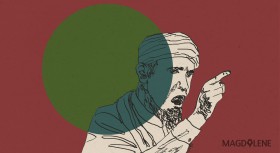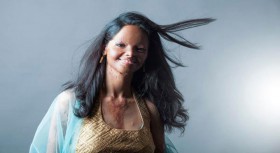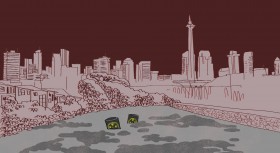Lesbian, gay, bisexual and transgender (LGBT) people in Indonesia are vulnerable to discrimination and violence, and even threatened to be criminalized by the state, therefore it is the media's task to end the stigma and fight the oppression through responsible coverage of the LGBT-related issues.
This was the gist of a discussion on Monday (Aug. 8) conducted by The Partnership for Governance Reform (Kemitraan), the Press Council and the LGBT community. With the theme “Journalists’ Roles to Encourage Tolerance of Gender and Sexual Diversity," the discussion aims to raise awareness on LGBT problems and introduce some ways about how media can contribute to help end the stigma and discrimination against LGBT people.
When the state failed to fulfil the basic constitutional rights of its citizens, the media had the responsibility to "demand justice for the marginalized, erase the stigma and prevent criminalization," said Henry Simarmata from Kemitraan.
Poor and irresponsible news coverage on LGBT further spreads homophobia and transphobia, worsening discrimination against the LGBT group.
Yulita from Arus Pelangi cited some cases in which stigma against LGBT people have fueled violence. Two girls were raped by a truck driver as they were going home after attending a course, she said. The truck driver justified his action by saying he did it because they are lesbians, which they are not.
"In Kalimantan, some students were expelled from their schools also because they were presumed to be homosexuals,” she added.
Transgender people are the most susceptible targets because they can easily be identified by their appearance, she said. Many trans people were evicted by force from their boarding houses after radical groups threatened to burn the houses if the former stayed.
Sam, a member of Transmen Indonesia, a support group for transgender men, further illustrated the challenges faced by trans people, especially when it comes to accessing healthcare.
“Some of us often got rejected in hospitals because they fear that providing service for transgender men would attract media’s attention and cause unnecessary fuss,” he explained.
The media often exploit vulnerable groups in their quest for sensational news and controversies, said Yosep Stanley Adi Prasetyo from the Press Council.
“Journalists should be free from the influence and intervention of money and power. However, being independent doesn’t mean journalists should not take side at all. It means they should only side with the truth, justice and peace.”
Stanley encouraged journalists to be sceptical and curious and therefore have the thirst to verify information instead of conforming to popular notions. He also listed some basic roles of journalists in the media, including;
- Surveillance – monitoring in order to provide useful and accurate information for their audience/readers
- Interpretation – the media should not only provide facts and data, but also interpretation, comments or arguments (which can be run in the editorial section), so that people can obtain a perspective regarding some news/issues
- Transmission of values – the media should function as a medium of socialization that can help society understand important values
At last, he added that “media should be able to protect diversity” as stipulated in the Journalistic Code of Ethics No.8: “Indonesian journalists should not write or exhibit news reports that are prejudice or that discriminate against an individual based on his/her ethnicity, race, skin color, religion, gender, and language, as well as not persecute the weak, the poor and the disabled.”
*If you find news report/coverage that discriminates against marginalized groups, you can file a report to Press Council here, so that the related-media can be evaluated.
Read Ayunda's piece on discrimination and violence against women followers of traditional faiths









Comments